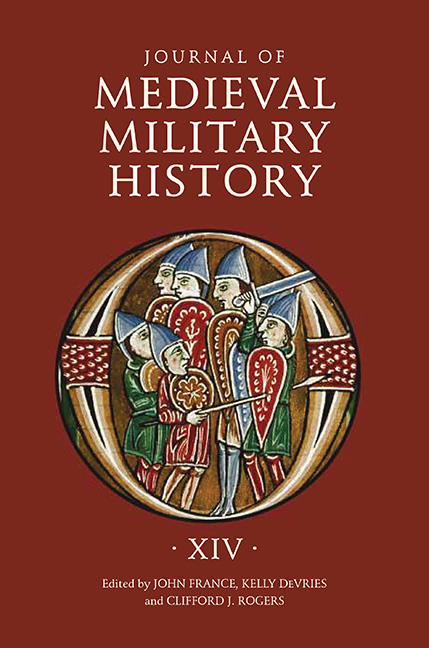Book contents
- Frontmatter
- Contents
- 1 Anglo-Norman Artillery in Narrative Histories, from the Reign of William I to the Minority of Henry III
- 2 Imperial Policy and Military Practice in the Plantagenet Dominions, c. 1337–c. 1453
- 3 The Parliament of the Crown of Aragon as Military Financier in the War of the Two Pedros
- 4 Chasing the Chimera in Spain: Edmund of Langley in Iberia, 1381/82
- 5 Note: A Medieval City under Threat Turns Its Coat, while Hedging Its Bets – Burgos Faces an Invasion in Spring 1366: Introduction and Translation
- 6 Medieval European Mercenaries in North Africa: The Value of Difference
- 7 Medieval Irregular Warfare, c. 1000–1300
- 8 Muslim Responses to Western Intervention: A Comparative Study of the Crusades and Post-2003 Iraq
- 9 “New Wars” and Medieval Warfare: Some Terminological Considerations
- 10 Friend or Foe? The Catalan Company as Proxy Actors in the Aegean and Asia Minor Vacuum
- List of Contributors
- Journal of Medieval Military History
- De Re Militari and the Journal of Medieval Military History
10 - Friend or Foe? The Catalan Company as Proxy Actors in the Aegean and Asia Minor Vacuum
Published online by Cambridge University Press: 12 September 2017
- Frontmatter
- Contents
- 1 Anglo-Norman Artillery in Narrative Histories, from the Reign of William I to the Minority of Henry III
- 2 Imperial Policy and Military Practice in the Plantagenet Dominions, c. 1337–c. 1453
- 3 The Parliament of the Crown of Aragon as Military Financier in the War of the Two Pedros
- 4 Chasing the Chimera in Spain: Edmund of Langley in Iberia, 1381/82
- 5 Note: A Medieval City under Threat Turns Its Coat, while Hedging Its Bets – Burgos Faces an Invasion in Spring 1366: Introduction and Translation
- 6 Medieval European Mercenaries in North Africa: The Value of Difference
- 7 Medieval Irregular Warfare, c. 1000–1300
- 8 Muslim Responses to Western Intervention: A Comparative Study of the Crusades and Post-2003 Iraq
- 9 “New Wars” and Medieval Warfare: Some Terminological Considerations
- 10 Friend or Foe? The Catalan Company as Proxy Actors in the Aegean and Asia Minor Vacuum
- List of Contributors
- Journal of Medieval Military History
- De Re Militari and the Journal of Medieval Military History
Summary
The term “vacuum” could apply to the Aegean and Asia Minor region at almost any point between the shattering of the Byzantine empire by the Fourth Crusade in 1204 and the conquest of Constantinople by the Ottomans in 1453. During these years the area was divided amongst a number of competing factions, few of whom – with the exception of the Ottomans in the fifteenth century – dominated for any significant length of time. Despite this instability, the region remained hugely important, especially within the context of trade between Europe, the Mediterranean and Asia. As a consequence it was hotly contested by internal and external powers from a variety of ethnic, religious and political backgrounds. In particular, the region witnessed the growing use of “proxy actors” by external forces, who aligned themselves with local factions in order to gain influence and further their interests in the area. The study of proxy warfare in the Aegean and Asia Minor takes on added significance, given the prevalence of discussions amongst military historians and policy makers around “epochal change theory” and the emergence of a “new Middle Ages” or “neo-Medievalism” in modern military encounters, which it is claimed has led to a rise in irregular warfare against violent non-state actors, for which proxies of various types are regularly employed (e.g. warlords, militias and mercenaries). Thus, when compared to present- day military encounters – not least in regions of the Middle East where a power vacuum has also developed into a crucible of different competing factions and intervening (but indecisive) outside powers – certain parallels can be drawn with the use of proxies in the fourteenth-century Aegean and Asia Minor.
Of particular importance for the discussion ofmedieval proxy actors in this region are the mercenary band known as the Catalan Grand Company, who campaigned in Asia Minor, the Aegean andGreece from1303 to 1311, before conquering the duchy of Athens and ruling it until 1388. The exploits of the Catalan Company are well known and have been the focus of many detailed studies, pioneered by Antonio Rubió y Lluch in the late nineteenth and early twentieth centuries. Kenneth M. Setton made the Catalans accessible to an English readership in the mid-twentieth century through his studies into their rulership of Athens, many aspects of which have since been expanded and improved by other eastern-Mediterranean specialists.
- Type
- Chapter
- Information
- Journal of Medieval Military HistoryVolume XIV, pp. 163 - 178Publisher: Boydell & BrewerPrint publication year: 2016

